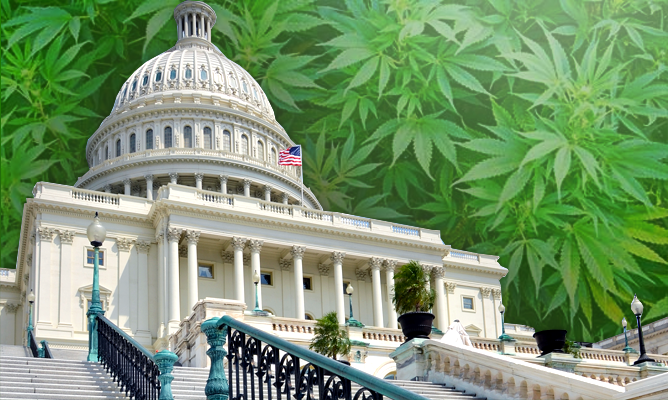
Congress Passes New Spending Measure To Help End Federal Marijuana Prohibition
Congress passed a 1,603 page federal spending measure this past Saturday evening that had a provision included that effectively ends federal prohibition on marijuana. The new measure blocks the Department of Justice (DOJ), which includes the Drug Enforcement Administration (DEA), from allocating and spending funds chasing after legal, retail and medical marijuana operations in the United States.
Included under this new umbrella, state-level hemp laws are also not to be interfered with. At the same time, the bill also contains a provision that impedes the implementation of Washington D.C.’s approved recreational marijuana initiative. Activists for full marijuana legalization are definitely torn on this one, but many can’t deny that this is a big step in the right direction.
Congress Ends State-wide Medical Marijuana Prohibition
Many people have concerns that a less-tolerant administration in the future will try to revise the bill. Regardless, this is the first time since cannabis was initially made illegal nationwide with the Marijuana Tax Act of 1937 that we have seen national support for ending prohibition. “The war on medical marijuana is over. Now the fight moves on to legalization of all marijuana,” said Bill Piper, a lobbyist with the Drug Policy Alliance. Removing patients from the line of fire shouldn’t have required a bill but now that one has passed, it is safe to say that states with legal medical marijuana are going to be sleeping a lot easier now.
 Allen St. Pierre of NORML, has said he believes that this shift in medical marijuana policy is representative of the changing demographic of our government officials across the board. “More and more baby boomers and millennials are moving into positions of power and doing away with outdated policies,” he goes on to say.
Allen St. Pierre of NORML, has said he believes that this shift in medical marijuana policy is representative of the changing demographic of our government officials across the board. “More and more baby boomers and millennials are moving into positions of power and doing away with outdated policies,” he goes on to say.
Washington DC Caught in the Crossfire
With Obama signing this into law this week, federal agents are no longer allowed to raid any legal medical marijuana or hemp operations. However, this victory is part of a two sided coin. On one end, we have something to celebrate but on the other, Washington D.C. has been caught in the crossfire for no discernible reason. With the passing of the federal spending bill, D.C. was blocked from implementing its recreational marijuana programs. There is hope that D.C. will continue to actualize their plans based on a technicality.
“…this shift in medical marijuana policy is representative of the changing demographic of our government officials across the board.” – Allen St. Pierre of NORML
The text of the bill says no funds “may be used to enact any law, rule, or regulation to legalize or otherwise reduce penalties associated” with recreational use of drugs illegal under federal law. “Some advocates I’ve spoken with aren’t so sure” the bill blocks legalization, Marijuana Majority chairman Tom Angell told The Huffington Post. “It all hinges on the definition of the word ‘enact.'”
This triumph sends a strong message to America and all her states. Your vote did have an impact; legalizing on the state level has influenced the federal government. So many patients still live in fear even though their state has legalized medical marijuana and their doctor has written them a prescription to use a wonder plant to cure their ailments. Now, they can actually feel safe and protected by the law again. For so many patients, legality has been reason enough to suffer, to die earlier than necessary, and to choose prescriptions over cannabis. This kind of revolution changes the conversation.
Federal Government Eases Up On Medical Marijuana Patients
For the first time since the mid 1970’s, the federal government has gotten closer to providing disability-equality than we have ever seen. In November, 1976, Robert Randall won in court against the federal government forcing them to provide him with the only known cure to glaucoma: cannabis. Since then, the medical marijuana program has had a maximum of 15 patients at any given time and was closed to more entries in 1992. Only four patients remain in the program today.
While the federal government won’t be providing the nation’s ill with free cannabis, they have agreed to guarantee their peace. “This is a victory for so many, including scores of our wounded veterans, who have found marijuana to be an important medicine for some of the ailments they suffer, such as PTSD, epilepsy and MS,” says Rep. Dana Rohrabacher (R- Calif.), co-sponsor of the medical marijuana protections bill.